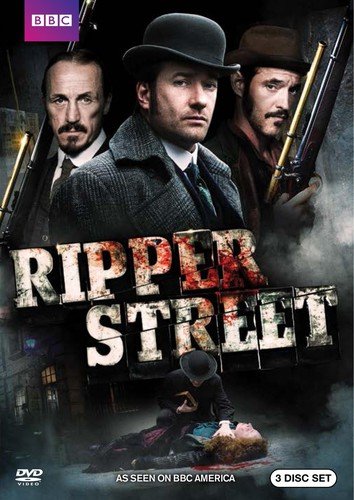
Written by Kristen Lopez
The BBC has created a steady output of television shows that have strong dramatic tension paired with worthy scripts and fantastic actors. Their latest series, Ripper Street, is good, but it’s a wanting in certain areas. Despite having a phenomenal trio of leading men, held together by Pride and Prejudice star Matthew Mcfadyen, the similarities to other movies and television shows leaves the plot wandering to differentiate itself for longer than necessary. Once things get into a groove, the plots are fairly standard, but are elevated by the acting.
The officers of H Division have been hoping to move past the unsolved mystery of Jack the Ripper. Inspector Edmund Reid (Mcfadyen) not only has Ripper on his mind, but the loss of his daughter in a mysterious accident. Alongside his American surgeon, Homer Jackson (Adam Rothenberg), and partner Detective Bennett Drake (Jerome Flynn), the trio solves a slew of crimes throughout London, hoping to find Ripper.
The cheapest way to say why audiences should seek out Ripper Street is by stating “If you liked the other BBC dramas out there, than you’ll like this.” It’s trite, but all BBC original series have a specific look and feel to them; especially their dramas. Ripper Street is no different, and at times it feels uncomfortably similar to other dramas on the same channel. The closest comparisons are Whitechapel and Copper. Having just finished up the latter, the similarities between the two are too close for comfort. Both series have side plots involving the goings-on in a whorehouse, and both main characters suffer from the loss of a daughter. The first few episodes of Ripper Street seem mired in realizing it’s no different from Copper, and try to throw in a few different elements to set it apart. By episode five, the scripts and acting have branched out to create a more dynamic series.
For a show entitled, Ripper Street, Jack the Ripper factors in little throughout the first series. The pilot episode, “I Need Light,” is entirely about Ripper, focusing on a series of copycat killings that end up having nothing to do with the infamous murderer. While H Division is smarting from not nabbing the killer, the series never makes the overarching plot being about bringing him down. Sure, they’ll mention the return of a criminal that they once suspected of being him, but the series never sets out to say “By the end of this series, we’ll collar Jack the Ripper.” The Series 1 finale, “What Use Our Work,” concludes with the Ripper case wide open, and with little chance of being solved. I appreciated this because the audience is well-aware the nature of the Jack the Ripper killings, so we never expect that core mystery to be concluded. Any suspect thrust forward would be a pointless way of presenting a theory, or simply furthering a better plot point. The series works through a standard “mystery of the week” format with some stories being more intriguing than others. The similarities to Guy Ritchie’s Sherlock Holmes are evident, but again the acting transcends anything Ritchie puts out.
Matthew Mcfadyen is primed to play a police detective. He projects a warmth and sensitivity that you wouldn’t expect from a police detective who’s seen a woman’s guts ripped out (the show skews to the gory at times). His core character arc is his inability to believe his daughter is dead, which can cause his character to feel hokey at times. Mcfadyen has the perfect hangdog face, so in the finale when he believes he’s found his child, your heart soars only to come crashing down by the look the actors face when he discovers the girl isn’t his own.
The one to watch out for is Rothenberg as the rakish Homer Jackson. Jackson started out as the loveable cad who provided comic relief, but as the series progresses his character is fleshed out. He’s a man who almost dies for love, and is incredibly brilliant when alcohol and women don’t cloud his vision. Flynn is also fantastic as the romantic Drake who pines for the love of the wayward prostitute, Rose (Charlene McKenna). The latter two characters could easily have been marginalized sidekicks, but received fully-realized characters that easily create the trio that is the flesh and life’s blood of Ripper Street.
The show is not without its problems. There really isn’t any major conflict at the end of the series, possibly for fear of a single series? The ending of the series concludes with Rose being in peril for what felt like the thousandth time, and after closing the book on that, it was business as usual. There’s still the case of Ripper (which I hope they don’t solve) and Reid’s missing daughter, but that’s really it. A whole series with very little momentum by the end. Also, the women are painfully underdeveloped. There’s Reid’s emotional wife, Reid’s foreign mistress (which honestly felt out of left field, and apparently the writers agree with how often it’s handled), and the gaggle of prostitutes of which the domineering madam and the ditzy Rose take precedence. Going into Series 2, the screenwriters should flesh out these females and actually humanize them. Outside of the literal Madonna’s and whores the women are set up as, there’s really nothing to make them interesting.
The DVD itself has a solid transfer, and a few interesting features for one-off viewing. “Jack the Ripper: Prime Suspect” explores the slayings with the aid of modern technology, although there’s far too many books that explore it better. “London Calling: Whitechapel” simply tours the modern locale that Ripper Street is about. There’s a few behind the scenes items and character profiles. The show is really the reason to buy, and aside from a few flaws in writing, and attempting to have the show find its feet, Ripper Street is easily worth watching when Series 2 premieres.